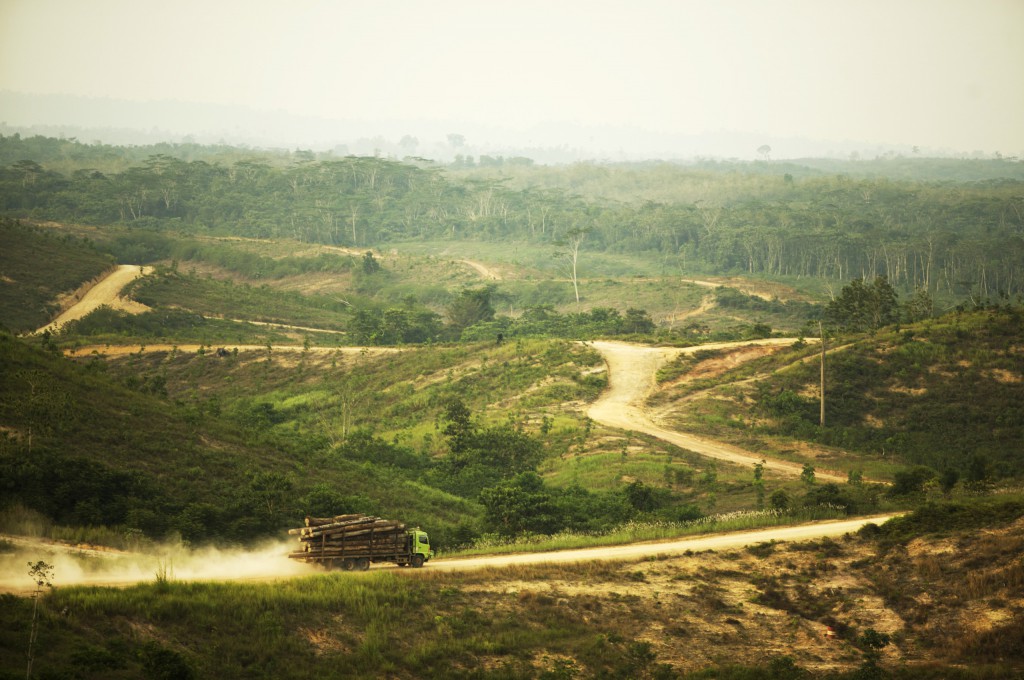Last week I was in Sumatra, Indonesia, traveling with representatives from the local NGO Warsi, investigating the impacts of Asia Pulp and Paper (APP), a wholly owned subsidiary of Sinar Mas, on forests and forests peoples.
Two days of 4×4 travel over dirt roads brought my team to PT Wirakarya Sakti (WKS). There, I spoke to members of the Orang Rimba, a nomadic indigenous group, who have been marginalized by Asia Pulp and Paper at WKS, sleeping along side logging roads in increasingly degraded remnant patches of forest.
Asia Pulp and Paper logging truck passing through the degraded lands of PT WKS – Photo by David Gilbert
APP security was tight; We passed through 3 checkpoints, slowly working our way deeper into the forest concession. Finally, when we arrived to the edge of WKS bordering Bukit Tigapuluh National Park, private security forces turned us away. Just beyond the gates, biodiverse lowland rainforests are being illegally logged by Asia Pulp and Paper. On rough estimate, 100 trucks carrying giant felled hardwoods emerged from this forest in one day, headed to the nearby APP pulp and paper factory.
This week, a broad coalition of Indonesian social and environmental NGO’s released a statement condemning Asia Pulp and Paper for their unsustainable practices at PT Wirakarya Sakti (WKS). The statement was triggered by the recent certification of WKS by Lembaga Ekolabel Indonesia (LEI) as a sustainable forest plantation.
The groups called the certification “inappropriate” and Diki Kurniawan of Warsi said “This certification is not credible and transparent, because inputs by NGOs and affected communities were ignored.”
The groups cite the massive destruction of natural forests ongoing in the Asia Pulp and Paper concession WKS. More than 48,000 hectares (59%) of the WKS forest was cleared from 2007 to 2008. WKS currently holds an industrial timber plantation permit (HTI) from the government of Indonesia, which strictly prevents Asia Pulp and Paper from clearing natural forest. HTI operations, by law, must only be established on degraded land. Peatlands are protected by presidential decree in Indonesia, but Asia Pulp and Paper’s WKS has cleared 70% of the peatlands encompassed in their concession between 2007-2008. The rapid and large scale conversion of natural forests outside of Indonesian law led Indonesian civil society to question the validity of LEI’s certification and Asia Pulp and Paper’s operations in general.
PT WKS is home to 10,000 Indonesians, about 500 of which are members of the Orang Rimba indigenous group who still practice a nomadic lifestyle in the forests of Sumatra. Many local farmers have lost their lands to WKS, and the Orang Rimba are increasingly marginalized. Many conflicts have take place, from arrests to burnings of company equipment by local people. LEI certification is specifically required to account for social impacts of Asia Pulp and Paper operations; the high levels of social conflict at WKS are anything except sustainable and raise serious questions regarding the validity of APP’s LEI certification.
David Gilbert is a Research Fellow at RAN. He has worked in the tropical forests of the Amazon and Indonesia, with a special focus on forest conservation and indigenous rights.
He can be reached at davidgilbert@ran.org
